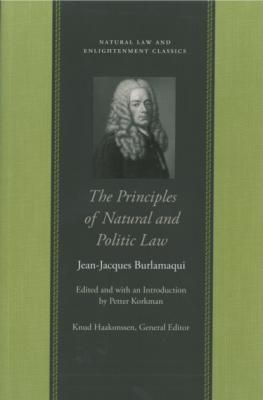ТОП просматриваемых книг сайта:
The Principles of Natural and Politic Law. Jean-Jacques Burlamaqui
Читать онлайн.Название The Principles of Natural and Politic Law
Год выпуска 0
isbn 9781614871835
Автор произведения Jean-Jacques Burlamaqui
Жанр Философия
Серия Natural Law and Enlightenment Classics
Издательство Ingram
Sect. 2. Second remark. There is neither sovereignty nor necessary dependance between beings perfectly equal.
Sect. 3. Different opinions on the origin and foundation of sovereignty.
Sect. 4. Examen of those opinions. 1. The sole superiority of power is insufficient to found a right of commanding.
Sect. 5. 2.Nor the sole excellence or superiority of nature.
Sect. 6. 3.Nor the sole quality of creator.
Sect. 7. True foundation of sovereignty; power, wisdom, and goodness, joined together.
Sect. 8. Explication of our opinion.
Sect. 9. We must not separate the qualities which form the right of sovereignty.
Sect. 10. Definition of subjection. Foundation of dependance.
Sect. 11. The obligation produced by law, is the most perfect that can be imagined.
Sect. 12. Obligation is internal and external at the same time.
CHAPTER X
Of the end of laws; of their character, differences, &c.
Sect. 1. Of the end of laws, either in regard to the subject, or in respect to the sovereign.
Sect. 2. [Section number is missing in Nugent text.]
Sect. 3. The end of laws is not to lay a restraint upon liberty, but to direct it in a proper manner.
Sect. 4. Examen of what Puffendorf says concerning this subject.
Sect. 5. Of the distinction of law into obligatory, and that of simple permission.
Sect. 6. The opinion of Grotius and Puffendorf upon this subject.
Sect. 7. The rights which men enjoy in society, are founded on this permission.
Sect. 8. The matter of laws.
Sect. 9. Internal conditions of a law; that it be possible, useful, and just.
Sect. 10. External conditions of law; that it be made known; and accompanied with a sanction.
Sect. 11. The obligation produced by law, is the most perfect that can be imagined. [Section title omitted in Nugent text.]
Sect. 12. Whether the promise of recompence is equally capable, as the commination of punishment, to constitute the sanction of law.
Sect. 13. Who those are whom the law obliges. Of dispensation.
Sect. 14. Of the duration of laws, and how they are abolished.
Sect. 15. How many sorts of laws.
CHAPTER XI
Of the morality of human actions.
Sect. 1. In what the morality of actions consists.
Sect. 2. Actions are, 1. either commanded, or forbidden, or permitted.
Sect. 3. Remarks on permitted actions.
Sect. 4. 2. Actions are good or just, bad or unjust, and indifferent.
Sect. 5. Conditions requisite to render an action morally good.
Sect. 6. Of the nature of bad or unjust actions.
Sect. 7. All just actions are equally just; but unjust actions are more or less unjust.
Sect. 8. Essential character of unjust actions.
Sect. 9. Of indifferent actions.
Sect. 10. Division of good and bad actions.
Sect. 11. Of justice and its different kinds.
Sect. 12. Of the relative estimations of moral actions.
Sect. 13. Morality is applicable to persons as well as actions.
PART II
Of the Law of Nature.
CHAPTER I
In what the law of nature consists, and that there is such a thing. First considerations drawn from the existence of God and his authority over us.
Sect. 1. Subject of this second part.
Sect. 2. [Section number is missing in Nugent text.]
Sect. 3. Whether there are any natural laws.
Sect. 4. Of the existence of God.
Sect. 5. First proof. The necessity of a self-existent and intelligent being.
Sect. 6. We must not seek for this being in this material world.
Sect. 7. Second proof. The necessity of a first mover.
Sect. 8. Third proof. The structure, order, and beauty of the universe.
Sect. 9. The world is not the effect of chance.
Sect. 10. It is not eternal.
Sect. 11. God has a right to prescribe laws to man.
Sect. 12. This is a consequence of his power, wisdom, and goodness.
CHAPTER II
That God, in consequence of his authority over us, has actually thought proper to prescribe to us laws or rules of conduct.
Sect. 1. God exercises his authority over us, by prescribing laws to us.
Sect. 2. First proof, drawn from the very relations of which we have been speaking.
Sect. 3. Second proof, drawn from the end which God proposed to himself with respect to man, and from the necessity of moral laws, to accomplish this end.
Sect. 4. Confirmation of the preceding proofs.
Sect. 5. Third proof, drawn from the goodness of God.
Sect. 6. Fourth proof, drawn from the principles of conduct which we actually find within ourselves.
Sect. 7. These principles are obligatory of themselves.
Sect. 8. They are obligatory by the divine will, and thus become real laws.
CHAPTER III
Of the means by which we discern what is just and unjust, or what is dictated by natural law; namely, 1. moral instinct, and 2. reason.
Sect. 1. First means of discerning moral good and evil, namely, instinct or inward sense.
Sect. 2. Examples.
Sect. 3. Whence these sensations proceed.
Sect. 4. Of what use they are to us.
Sect. 5. Objection: these sensations are not found in all men. Answer: 1. We find some traces of them among the most savage people.
Sect. 6. 2.We must distinguish between the natural state of man, and that of his depravation.
Sect. 7. 3.If there be any monsters in the moral order, they are very rare, and no consequence can be drawn from them.
Sect. 8. Second means of discerning moral good and evil; which is reason.
Sect. 9. First advantage of reason in respect to instinct; it serves to verify it.
Sect. 10. Second advantage: it unfolds the principles, and from thence infers proper consequences.
Sect. 11. Third advantage: reason is an universal means, and applicable to all cases.

